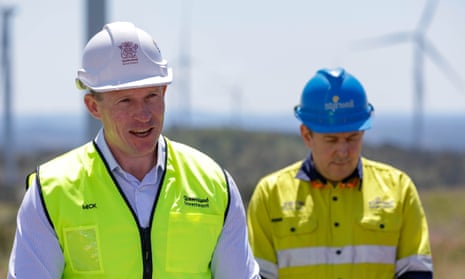Extract from The Guardian
Exclusive: The Queensland government will announce a $10m pilot fund to develop ‘micro grids’ in Aboriginal and storm-prone communities.

Queensland energy minister Mick de Brenni will announce the pilot fund on Thursday to support developments in First Nations communities and those prone to tropical storms.
He said the project aimed to help build energy resilience and reduce power bills, while also helping to decarbonise the state.
“Queensland’s grid is one of the largest in the world and some of these communities at the fringes – many of which are First Nations communities – are heavily reliant on infrastructure that is vulnerable to severe weather,” de Brenni told Guardian Australia.
The fund would be used to create a series of micro grids connected to the main grid, but also able to function independently if needed.
Yarrabah Aboriginal shire council mayor Ross Andrews said the announcement was an “encouraging first step” for energy sovereignty. Yarrabah is near Cairns on Gunggandji and Yidinji country, an area that frequently loses power during North Queensland’s monsoonal storm seasons.
“We thought: why not have our own form of alternative energy supply that can’t be so easily cut off, and is totally owned and operated within the community – and assist our families with energy prices and the cost of living,” Andrews said.
The council has already completed a feasibility study for a $22m project that it plans to submit in an application to the new fund.
“For us it’s about pride, but also self determination,” Andrews said. “Sovereignty through energy. It’s affordable, reliable, secure, and clean energy for our community to be resilient.”
Griffith University senior lecturer and energy expert Dr Sascha Stegen said that building micro grids would only lower power bills if it is was coupled with battery storage.
“That additional control of the grids could perhaps help lower bills, but only if it is triggers people to employ energy and storage in that area,” Stegan said. “And as far as I know, that was not part of the plan.”
It would however make taking that next step easier, he said.
de Brenni said the fund would work in conjunction with existing federal and state initiatives to help communities attract investment in renewable energy.
“The [total] investment will be significantly more than $10m,” he said. “This is really about identifying the first tranche of projects.”
Initially the fund will offer grants of up to $5m to support the construction of a micro grid, and between $250,000 up to $750,000 to help projects get “shovel ready”.
de Brenni said participating projects would be subject to detailed design and planning support as well as a regulatory review to assess legal and bureaucratic limitations.
Queensland aims to generate 50% of its electricity from renewable energy by 2030. The assistant minister for that target, Lance McCallum, a Gubbi Gubbi man, said micro grids have “unique benefits” for First Nations communities.
“As a proud First Nations Queenslander I know how important energy resilience and independence for these communities can be,” he said. “Micro grids will provide the ability to recover quickly or maintain energy supply during network outages caused by extreme weather events.”

No comments:
Post a Comment